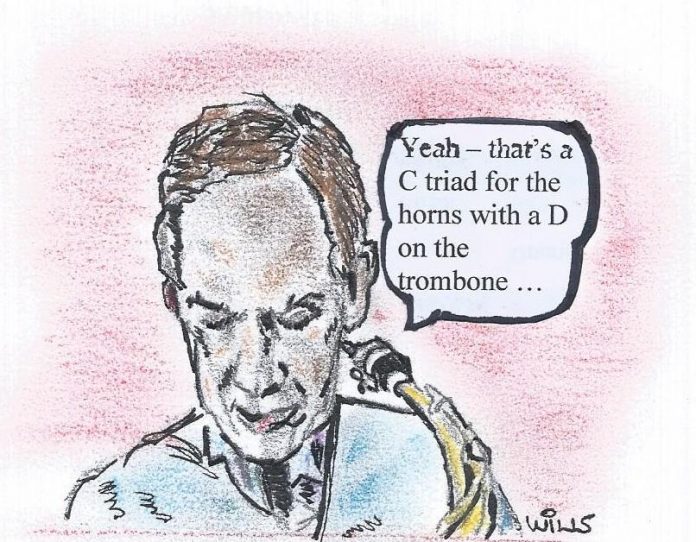More people should know about Fred Lipsius. He’s an excellent alto saxophonist, as well as playing tenor sax and piano and arranging and composing. Of course, he had quite a high profile between 1968 and 1971 when he was a member of jazz-rock group Blood, Sweat and Tears. On their second album, his sinuously boppish alto solos grace the tunes God Bless The Child and Blues – Part II, while on piano he solos fluently on Smiling Phases. In 1969 he won a Grammy for his arrangement of Spinning Wheel, with its distinctive C triad for the horns with a D on the trombone.
For a pop group, Blood, Sweat and Tears were very hip, with Gillespie-ish trumpet solos by Lew Soloff and Philly Joe Jones-inspired drumming by Bobby Colomby, whose brother Harry managed Thelonious Monk.
‘Freddie was as sweet and innocent as anyone could possibly be, and a corruption process was essential … we used to force-feed him marijuana and make him listen to James Brown …’
Fred Lipsius, a native of the Bronx, New York, was born in 1943 and, after starting on clarinet aged nine, he moved on to alto and tenor saxophone in Junior High School, and piano at Music and Art High School in Manhattan, continuing studies at Berklee School of Music between 1961 and 1962. From an early age he listened to Benny Goodman, Charlie Parker, Sonny Stitt and Cannonball Adderley. After graduation, Lipsius played in road bands and Broadway shows.
When Blood, Sweat and Tears formed and were looking for horn players, Bobby Colomby told Al Kooper that he knew a local legend who had been his boyhood idol. This was Lipsius. Kooper, in his book Backstage Passes And Backstabbing Bastards, describes Fred’s initiation process: “Freddie was as sweet and innocent as anyone could possibly be, and a corruption process was essential … we used to force-feed him marijuana and make him listen to James Brown …”
During his time with Blood, Sweat and Tears, Lipsius was able to play with some of his idols. At a concert that BS & T gave at the Greek Theatre in Los Angeles, Cannonball Adderley sat in with the band and complimented Fred on his playing. And, via Bobby Colomby’s brother, Fred and Lew Soloff sat in with Thelonious Monk at the Keystone Club in San Francisco, on a version of Friday The Thirteenth.
I’m surprised he didn’t carve a niche for himself alongside David Sanborn
After four and a half years with Blood, Sweat and Tears, during which time the band won nine gold records, Lipsius was ready to leave. He said in an interview that “things got very heavy at times. As wonderful as it was, I felt I needed to get away”. Initially, gigs were slow to come in: he admitted that he was not a particularly good business person, and that people probably thought that he didn’t need to work after his success with Blood, Sweat and Tears. I’m surprised he didn’t carve a niche for himself alongside David Sanborn. But, gradually, he started to play gigs with musicians like Larry Willis, George Mraz, Al Foster and Randy Brecker. In 1982 he joined the backing group of Simon and Garfunkel for their reunion, alongside musicians like Steve Gadd and Richard Tee, and toured Europe and Japan for seven weeks.
After the tour, with the encouragement of his friend, guitarist Rodney Jones, Lipsius decided to record his first jazz album. This was released on vinyl in 1984 with the title Distant Lover(s), and on CD in 1995 with a different title, Dreaming Of Your Love. It’s an excellent album, and is well worth seeking out. With a stellar rhythm section of Larry Willis, George Mraz and Al Foster, Lipsius displays his fluent Stitt/Cannonball style, with hints of Phil Woods in there as well, always with a romantic edge that lifts the music. The album’s programme includes ballads, loping blues and subtly alternating time signatures, and Somethin’ For R.J. is arguably the standout track. Taken at a breakneck tempo, with a slippery theme that’s a sort of variation on Giant Steps, it affords Lipsius the opportunity in his solo to give a master class in swinging, mainstream-modern alto playing. Larry Willis follows with typically immaculate piano, his quote from Billy Boy leading into a cymbal-shimmering drum solo from Al Foster. At 4’40”, it’s a short and totally satisfying performance.
Since 1984, Lipsius has taught at Berklee College of Music, and is now an Associate Professor, while still finding time to record more albums. Highly recommended is Rhythm, Catch 4 (2014), which sees him in a sextet setting, playing muscular tenor as well as alto. It will be interesting to see if any other albums are forthcoming, and with them, perhaps, overdue acclaim.
Edited 10/10/19: Fred Lipsius wrote to say “Please thank Geoff Wills for his excellent article about me and his great drawing!” and sent some links to his recent work:
Here’s the link for my song “Shells”. I’m singing on this (It’s the first time I’ve ever sung a song in the studio). The description below the video tells more about the song. https://www.youtube.com/watch?v=fdGDmlQTuzE
Here’s the direct link to 10 videos of me playing standard songs (5 solo piano and 5 solo alto sax) recorded 8/17/18 at Berklee College of Music. https://www.youtube.com/playlist?list=PLZXEMVbjEY3D7C2VuU50MQlLk2ofEjZLF
















